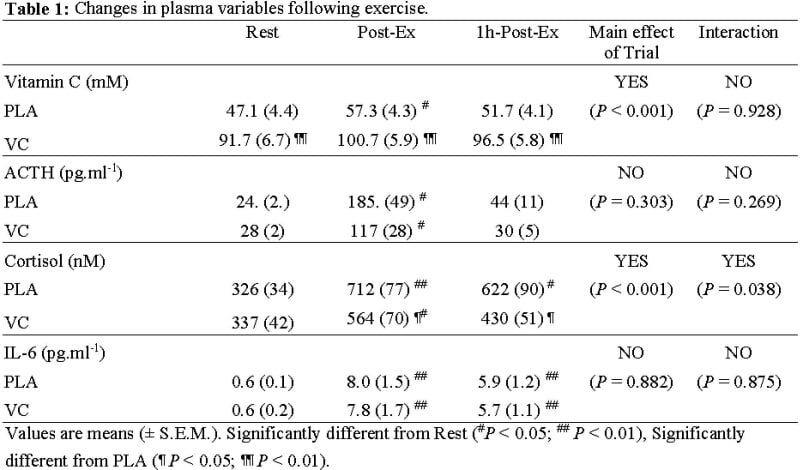Supplementation with antioxidants (vitamins C and E) for 28 days can reduce post-exercise increases in circulating interleukin (IL)-6 and cortisol concentrations (Fischer et.al., 2004). These authors demonstrated that the smaller increase in plasma IL-6 concentration resulted from reduced release from contracting skeletal muscle, and this may be a major factor contributing to a blunted cortisol response. However, it has been suggested that there may also be a direct inhibitory effect of antioxidant supplementation on adrenal cortisol production and/or release (Peters et.al., 2001). The aim of the present study was to determine the effect of 14 days of supplementation with a high dose of vitamin C alone on the systemic IL-6, adrenocorticotrophic hormone (ACTH) and cortisol responses to prolonged exercise. With local ethics committee approval, 9 healthy male cyclists (age 26 ± 2 years, body mass 71.8 ± 2.2 kg, VO2max 61.6 ± 2.4 ml.kg-1.min-1; mean ± S.E.M.) completed two main trials (2.5 hours cycling at 60% VO2max), after 14 days of placebo (PLA) or vitamin C (VC; 1000 mg.day-1) supplementation, in a single blind, counterbalanced-crossover design. This ensured a minimum of 14 days wash-out between trials. Venous blood samples were taken before exercise (Rest), immediately post-exercise (Post-Ex), and 1 h post-exercise (1 h Post-Ex). Plasma concentrations of IL-6, ACTH and cortisol were determined using ELISA kits. Plasma VC concentration was determined using an enzymatic spectrophotometric assay. Temporal changes were analysed for each trial separately using 1-way repeated measures ANOVA. To compare the two trials a 2-way repeated measures ANOVA was used. Paired t-test post hoc analysis was used where appropriate with the Holm-Bonferonni correction. The results (Table 1) suggest that there may be a direct inhibitory effect of VC on adrenal cortisol secretion since there was no effect of VC supplementation on IL-6 or ACTH yet plasma cortisol concentration was significantly lower post-exercise in the VC trial. However, the cortisol response was not completely blunted, as observed in the Fischer et.al. (2004) study, which suggests that there is an important role for IL-6. Therefore, a longer period of supplementation and/or additional lipid soluble antioxidants such as vitamin E may be required for greater reductions in exercise-induced IL-6 and cortisol release to occur.
King's College London (2005) J Physiol 565P, PC4
Communications: The effect of 14 days supplementation with vitamin C on plasma interleukin-6 and hormonal responses to prolonged cycling in man
Davison, Glen ; Hulston, Carl J; Gleeson, Michael ;
1. School of Sport & Exercise Sciences, Loughborough University, Leicestershire, United Kingdom.
View other abstracts by:
Where applicable, experiments conform with Society ethical requirements.

